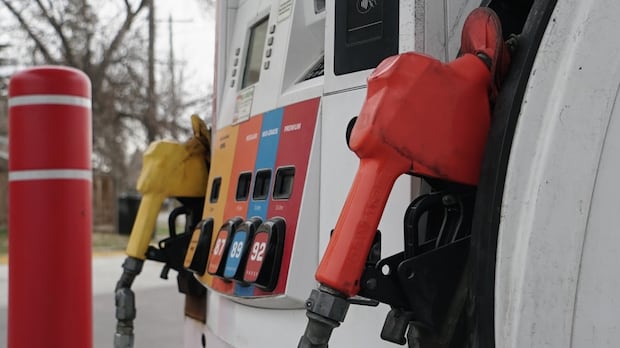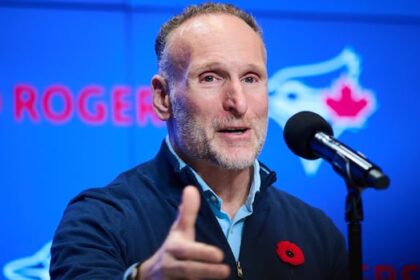New BrunswickA special levy charged to consumers at New Brunswick fuel pumps to help oil companies pay for tightening federal clean-fuel standards is scheduled to be cancelled by the New Brunswick government on Dec. 1, but that change promises to be temporary.Liberals drop blanket objection to oil companies passing federal green costs on to customers Robert Jones · CBC News · Posted: Nov 19, 2025 5:00 AM EST | Last Updated: 1 hour agoListen to this articleEstimated 5 minutesThe audio version of this article is generated by text-to-speech, a technology based on artificial intelligence.New Brunswick’s carbon cost adjuster currently adds up to 7.9 cents per litre to gasoline prices and 8.8 cents to diesel (plus HST). (Axel Tardieu, Radio-Canada)A special levy charged to consumers at New Brunswick fuel pumps to help oil companies pay for tightening federal clean-fuel standards is scheduled to be cancelled by the New Brunswick government on Dec. 1, but that change promises to be temporary.Natural Resources Minister John Herron said the regulation of petroleum prices in New Brunswick allows companies to recover all of their costs. He said this applies to the federal clean-fuel standards and will require a new charge to replace at least part of what is being cancelled.”I am certain that there are costs of compliance to the clean fuel regulations,” said Herron in an interview this week. “In a regulated marketplace the sector is entitled to recover the cost of operations.”The current levy, which is directly tied to the federal clean-fuel policy was established by the former government of Blaine Higgs to allow oil companies to pass the costs of complying with the federal standards through to consumers.New Brunswick Natural Resources Minister John Herron said he expects consumers will face some kind of new fuel charge to pay for federal environmental costs on oil companies after the current “cost of carbon adjuster” charge is eliminated. (Jacques Poitras/CBC)New Brunswick Liberals called that decision “wrong” and made a promise to end what is known as the “cost of carbon adjuster” charge during the 2024 provincial election. As a result, the adjuster, which this week is adding up to 7.9 cents per litre to gasoline prices and 8.8 cents to diesel (plus HST) is scheduled to terminate at the end of this month. However, there are offsetting plans to have the charge recalculated and renamed and then readded to pump prices that consumers could be paying for again quickly.WATCH | Adjuster reboot: Out with the old gas price charge, in with the new:N.B.’s cost of carbon adjuster is done Dec.1, but is a replacement on the way?New Brunswick Liberals have changed their stance on whether consumers should pay at the pump for oil company environmental costs. Herron said he is unsure how much a recalculated charge to consumers will be but expects consumers will eventually have to pay something toward the cost of tighter environmental standards on oil companies in a new levy after the current levy is terminated.”I would agree with that,” he said.That is an about-face for New Brunswick Liberals.As opposition leader, Susan Holt objected to any charge on fuel that would require consumers to pay for environmental costs imposed on oil companies. In promising to eliminate the amount allowed in New Brunswick, she made no mention of replacing it with another amount.”The Clean Fuel Regulations were designed to be borne by producers and refineries,” Holt said in the legislature in October 2023.”This government chose to make a special loophole to bypass that so that New Brunswickers would pay instead of the refineries. We think that is a poor decision, and New Brunswickers think that is a poor decision.”The current adjuster amount changes weekly based on a formula adopted by the New Brunswick Energy and Utilities Board and on gasoline over the last 28 months has ranged in price from as low as three cents per litre to as high as nine cents.Premier Susan Holt said that allowing federal environmental costs on refineries to pass through to consumers was the “wrong decision” in 2023. (Mikael Mayer / CBC)The EUB has no direct information from oil companies about the costs they have encountered from the federal policy and has relied on a consultant’s model to estimate what those costs might be.Petroleum retailers have been alarmed at government plans to cancel the charge. They have expressed concern oil companies will continue to bill them elevated amounts for product because of the federal environmental costs that they will not be able to afford to pay.Carol Montreuil with the Canadian Fuels Association told CBC News last month that many retailers in the province will struggle to survive if seven or eight cents per litre is cut out of what they can pass through to consumers when the current carbon adjuster expires.”There’s no doubt that with such a big number some retailers will not be able to make ends meet,” Montreuil Canadian Fuels Association said. “There’s just no doubt.”Retailers are already in front of the Energy and Utilities Board asking for a replacement “market adjuster” of “equivalent’ value to take the place of the carbon adjuster on the day it ends. The Irving Oil refinery in Saint John is Canada’s largest. The refinery is facing tightening federal environmental rules, but the actual cost of those is unclear. (Roger Cosman/CBC)In October, about a year after she became premier, Holt said the province wants to see the Energy and Utilities Board base any new charge to consumers on actual compliance costs refiners and fuel importers are facing, not estimated costs. But objections to consumers paying for those costs have disappeared.”That data is lacking in the system right now,” Holt said about the need to know real costs refiners and fuel importers are facing.”Having that can reassure us and New Brunswickers that they aren’t paying a penny more than they need to for gas.” ABOUT THE AUTHORRobert Jones has been a reporter and producer with CBC New Brunswick since 1990. His investigative reports on petroleum pricing in New Brunswick won several regional and national awards and led to the adoption of price regulation in 2006.
N.B. consumers to pay refinery environmental costs at the fuel pump after all











